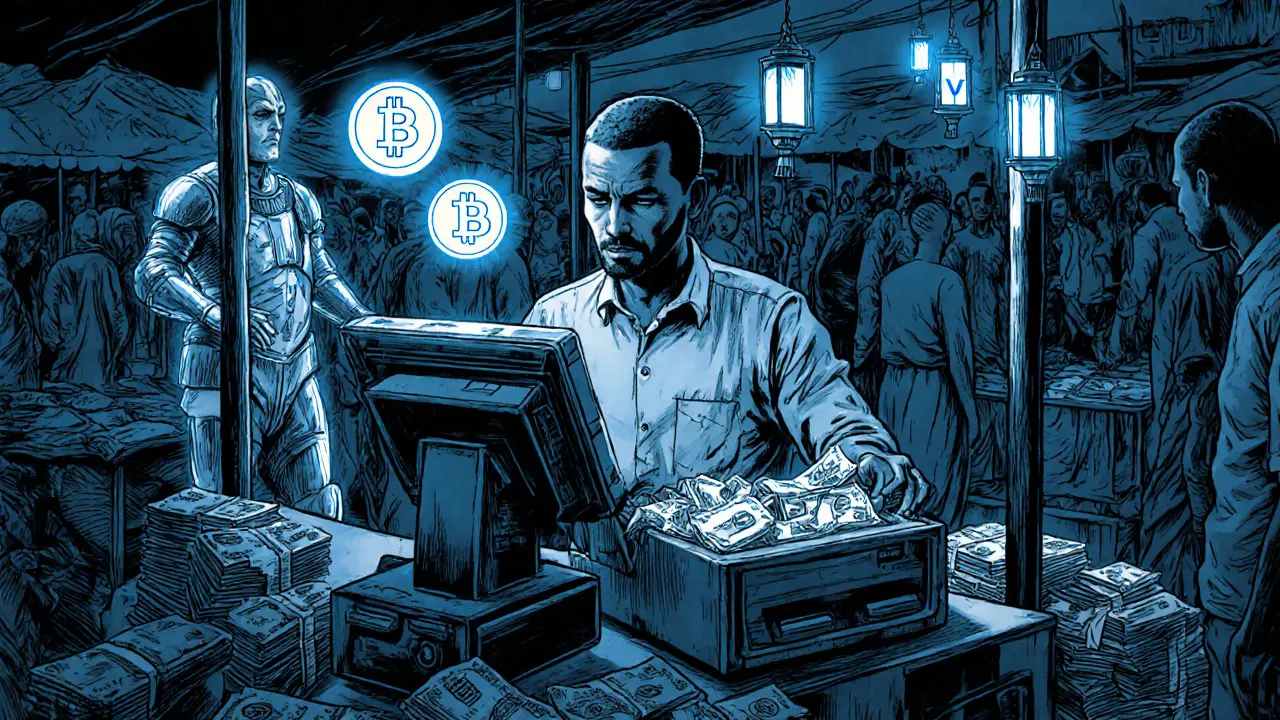Crypto Payment Processing Cost Calculator
Calculate Your Costs
Determine if accepting crypto payments is feasible for your business under Nigeria's current regulations
Your Monthly Crypto Payment Costs
According to the Investments and Securities Act (ISA) 2025, only licensed Virtual Asset Service Providers (VASPs) can process crypto payments in Nigeria. The minimum capital requirement for VASP licensing is ₦500 million ($350,000 USD).
Key Considerations
- The average transaction fee for licensed VASPs ranges from 1.5% to 3.5%
- The minimum capital requirement for VASP licensing is ₦500 million
- Only 11% of Nigerian merchants who tried crypto payments before 2025 are still using them due to costs
Can a business in Nigeria legally accept Bitcoin, Ethereum, or USDT as payment? The short answer is: not directly - but there’s a legal workaround that’s changing how companies handle crypto payments.
In 2025, Nigeria’s crypto rules shifted dramatically. The Investments and Securities Act (ISA) 2025, signed into law in March, gave the Securities and Exchange Commission (SEC) full control over digital assets. But here’s the catch: crypto isn’t legal tender. Only the Naira is. That means you can’t walk into a Lagos shop, hand over 0.5 BTC for a phone, and expect it to be treated like cash.
Before 2025, things were even messier. In 2021, the Central Bank of Nigeria (CBN) banned banks from dealing with crypto exchanges. That forced businesses to rely on peer-to-peer (P2P) platforms. Many small vendors used Binance P2P or LocalBitcoins to convert crypto to Naira. But that was risky - no protections, no oversight, and constant fear of account freezes. By 2024, Nigeria was second in the world for crypto adoption, with over $1.2 billion in monthly P2P trades. Yet, less than 5% of businesses had a legal way to accept it.
What Changed in 2025?
The ISA 2025 didn’t ban crypto - it reclassified it. Digital assets are now treated as securities, not money. That means they fall under the same rules as stocks and bonds. For investors, this is good news. It brings transparency, protects against scams, and opens the door for institutional players. For merchants? It’s a wall.
The SEC made it clear in their April 2025 guidance: “Digital assets are recognized as securities and investment instruments, not as currency substitutes for everyday commercial transactions.” So if you’re a restaurant owner, a clothing store, or an online seller trying to take crypto as payment, you’re breaking the law - unless you’re licensed.
Who Can Legally Accept Crypto?
Only three types of entities are allowed to handle crypto legally under the new rules:
- Virtual Asset Service Providers (VASPs) - companies that custody, trade, or transfer crypto on behalf of others.
- Digital Asset Operators (DOPs) - firms that issue or manage tokenized assets.
- Digital Asset Exchanges (DAEs) - platforms where users buy and sell crypto.
To get licensed, you need at least ₦500 million ($350,000 USD) in capital. You must have 24/7 transaction monitoring, cold storage for 95% of assets, cybersecurity certified to ISO/IEC 27001, and a full AML/CFT system that reports to the Nigerian Financial Intelligence Unit (NFIU). The application process takes an average of 145 days. And 63% of first-time applicants get rejected - mostly for weak compliance plans.
As of September 2025, only 47 companies have been approved. Quidax, Bybit Nigeria, and Binance Nigeria dominate the market. These aren’t merchants - they’re intermediaries. Their job is to convert crypto to Naira for businesses that use them.
How Do Businesses Actually Accept Crypto Now?
If you’re a small business owner and want to accept crypto, here’s how it works in practice:
- You sign up with an SEC-licensed VASP like Quidax or Bybit Nigeria.
- You integrate their payment gateway into your website or POS system.
- A customer pays you in USDT or BTC.
- The VASP instantly converts it to Naira and deposits it into your bank account.
- You never hold crypto. You only receive Naira.
This isn’t “accepting crypto.” It’s accepting Naira - with crypto as the middleman. You get the benefit of international customers paying you without forex delays, but you pay a fee. Most VASPs charge between 1.5% and 3.5% per transaction. Add in setup costs of ₦85 million to ₦200 million if you’re building your own system, and it’s clear why only 11% of Nigerian merchants who tried crypto before 2025 are still doing it now.
One Jumia vendor on Twitter/X summed it up: “Had to turn away international customers who wanted to pay in USDT. SEC rules say I must convert to Naira first through their approved channels, adding unnecessary steps and fees.”

Why Not Just Let Crypto Be Money?
The CBN and SEC argue that treating crypto as currency would destabilize the financial system. They point to inflation, capital flight, and the risk of unregulated money flowing into the economy. Dr. Olayemi Cardoso, CBN Governor, said in April 2025: “Our approach prioritizes financial stability and investor protection over convenience.”
But critics say that’s a missed opportunity. Dr. Ngozi Okonjo-Iweala, former Finance Minister, wrote in May 2025: “By not creating a separate payment vehicle category for cryptocurrency, Nigeria is stifling innovation that could address our 36% unbanked population and high remittance costs.”
With over $25 billion sent home by Nigerians abroad every year, crypto could cut remittance fees from 10% to under 2%. But right now, most remitters still use Western Union or MoneyGram because they’re legal. Crypto is faster and cheaper - but legally risky for businesses to use.
What’s Next? The 2026 Outlook
The SEC admitted in September 2025 that the current system isn’t working for merchants. They announced a six-month review of the merchant acceptance rules. Proposals under discussion include:
- A new “Digital Payment Vehicle” category with lower capital requirements - possibly ₦50 million instead of ₦500 million.
- Simplified compliance for small businesses using approved gateways.
- Exemptions for microtransactions under ₦50,000.
At the same time, the Central Bank launched its own digital currency, the eNaira, in October 2025. It’s already used by 1.2 million people in its first week. The eNaira is government-backed, fully traceable, and designed for everyday payments. Many experts believe it will replace the need for private crypto in retail transactions.
Still, the demand won’t disappear. With 60 million Nigerians owning crypto - nearly 30% of the adult population - the pressure to find a legal, simple way to use it for shopping, bills, and services is growing.

Real-World Examples
Here’s what’s actually happening on the ground:
- Lagos Trader 87 runs an e-commerce store. Before 2025, he accepted Bitcoin directly. Got a warning letter from the SEC in January 2025. Shut it down. Now he uses BitFinance (a licensed VASP). Pays 3.5% fee. Says his margins are cut in half.
- CryptoBankerNG runs a licensed VASP. Onboarded 12,000 merchants since April 2025. Says the system works - but only for businesses that can afford the ₦500 million cap.
- MTN and Airtel accept crypto for international settlements through SEC-approved channels - but not for buying airtime or data. Their customers still pay in Naira.
- Small tech startups in Abuja and Port Harcourt use Quidax gateways to receive payments from overseas clients. They don’t hold crypto. They get Naira in 10 minutes.
The pattern is clear: crypto is used for investment and cross-border payments - not for buying bread, clothes, or phone credit.
Bottom Line: What Should You Do?
If you’re a business owner in Nigeria and want to accept crypto:
- Don’t try to accept it directly. You’ll risk penalties or account freezes.
- Do partner with an SEC-licensed VASP like Quidax, Bybit Nigeria, or Binance Nigeria.
- Do understand that you’re not getting crypto - you’re getting Naira, with extra fees.
- Do keep records. Even if you use a VASP, you’re still subject to AML reporting.
- Don’t expect crypto to replace Naira anytime soon. It’s a bridge, not a replacement.
The future might change. Maybe by 2027, Nigeria will create a lighter framework for small merchants. Maybe the eNaira will make private crypto irrelevant for payments. But for now, the rules are strict: crypto is an investment - not a currency.
If you’re a small business, the only legal path is through a licensed intermediary. It’s not ideal. It’s not cheap. But it’s the only way to stay compliant and keep your bank account open.
Is it legal for a Nigerian business to accept Bitcoin as payment?
No, it is not legal for a Nigerian business to accept Bitcoin or any cryptocurrency as direct payment for goods or services. Under the Investments and Securities Act (ISA) 2025, crypto is classified as a security, not legal tender. Only licensed Virtual Asset Service Providers (VASPs) can handle crypto transactions. Businesses must use these licensed platforms to convert crypto to Naira before receiving funds.
Can I use crypto to pay for goods in Nigeria?
You cannot use crypto directly to pay for goods in Nigeria. No retail store, restaurant, or online vendor can legally accept Bitcoin, Ethereum, or USDT as payment. Even if a shop claims to accept crypto, they are likely using a licensed VASP to instantly convert it to Naira. You’re paying in Naira - just via crypto as a middleman.
What happens if a business accepts crypto without a license?
Unlicensed businesses that accept crypto risk being investigated by the SEC and the Nigerian Financial Intelligence Unit (NFIU). Penalties include fines, account freezes, and criminal charges under anti-money laundering laws. Several small businesses received warning letters in early 2025 and were forced to shut down crypto payment channels.
How much does it cost to become a licensed VASP in Nigeria?
To become a licensed Virtual Asset Service Provider (VASP) in Nigeria, you need a minimum capital of ₦500 million (about $350,000 USD as of October 2025). Setup costs for compliance systems, cybersecurity, and legal documentation can reach ₦200 million. Ongoing compliance costs average 2.8% of transaction volume. Most small businesses can’t afford this - which is why they use existing VASPs instead.
Are there any businesses in Nigeria that accept crypto legally?
Yes - but only licensed VASPs like Quidax, Bybit Nigeria, and Binance Nigeria. These companies allow other businesses to accept crypto indirectly by converting it to Naira instantly. No retail business can accept crypto directly. Even large companies like MTN and Airtel only use crypto for international settlements, not for consumer payments.
Will Nigeria ever allow direct crypto payments?
Possibly - but not soon. The SEC announced a six-month review in September 2025 and is considering a new “Digital Payment Vehicle” category with lower capital requirements. However, the government is also pushing its own digital currency, the eNaira, which launched in October 2025. Experts believe Nigeria will keep crypto as a security for now and may allow limited merchant payments by 2027 - but not as legal tender.

garrett goggin
November 16, 2025 AT 22:36Oh wow the SEC is just protecting us from the *evil* crypto demons, right? Next they'll ban bicycles because people might use them to escape the matrix. They call it financial stability but it's just control wrapped in a compliance suit. The eNaira? More like the eSurveillance. They don't want you to have freedom, they want you to have a government-approved digital leash. And 63% rejection rate? That's not regulation, that's a pay-to-play cartel. The real crime is locking out 60 million people who just want to transact without begging a bank for permission.
Bill Henry
November 18, 2025 AT 15:38so i get that the rules are tight but like... why cant we just have a middle ground? like, small biz owners just wanna get paid by folks overseas without paying 3.5% every time. its not like theyre laundering money, theyre selling tshirts. the whole system feels like it was designed by people whove never actually run a store. why not let the little guys use the same gateways but with lower fees and less paperwork? im not saying go full crypto cash but like... give us a break?
Jess Zafarris
November 18, 2025 AT 18:29It’s fascinating how the SEC’s approach mirrors the same logic used to justify banning peer-to-peer lending in the 90s - ‘too risky for the little guy.’ But here’s the irony: the people most hurt by this are the ones who didn’t have access to banking to begin with. If crypto’s a security, why not create a subcategory for micro-merchant payments? Why force everyone through the same $350K gate? The real innovation isn’t in the tech - it’s in the regulation. And right now, Nigeria’s regulators are treating innovation like a disease to be quarantined.
jesani amit
November 19, 2025 AT 11:13Hey man, i totally get where you're coming from. i've seen so many small shops in lagos struggle with this. you know what helped me? using quidax gateway. yeah, it costs a bit, like 2.8% or so, but at least my bank account stays open and i can take payments from europe and usa without waiting 5 days for wire transfers. it's not perfect, but it's better than getting a letter from sec saying your account is frozen. i think if they lower the cap to 50 million like they're thinking, it'll open up a lot of doors. just need patience and smart choices. you're not alone in this fight.
Peter Rossiter
November 20, 2025 AT 05:573.5% fee on every transaction? that's robbery. and the fact that only 47 companies are licensed? that's not regulation that's a monopoly. the cbn and sec are just protecting their turf. they don't care about innovation they care about control. the eNaira is just their version of crypto but with a backdoor. you think they don't track every naira? they do. and they'll use it to punish dissent. this isn't finance it's fascism with a fintech veneer
Mike Gransky
November 20, 2025 AT 12:15The fact that this is even a debate shows how far we’ve drifted from basic economic principles. If a customer wants to pay you in USDT and you’re willing to accept it, why does the state need to be involved? Markets should be free to form their own terms. The real problem isn’t crypto - it’s the belief that central authorities know better than millions of individuals making voluntary exchanges. The eNaira isn’t progress. It’s centralization dressed up as innovation.
Ella Davies
November 21, 2025 AT 18:05Interesting how the article says crypto isn't legal tender but then allows VASPs to convert it to naira. So technically you're still getting paid in naira, just through a middleman. That’s not acceptance - it’s laundering with a fee. I wonder how many businesses are quietly using P2P anyway and just pretending to use the gateways. The system is so broken it’s practically inviting evasion.
Henry Lu
November 23, 2025 AT 08:56Anyone who thinks this is a fair system is delusional. Only billionaires can play. This isn't regulation it's class warfare. The SEC is basically saying 'you're not rich enough to deserve financial freedom.' And the eNaira? That's the government's way of saying 'we'll give you a digital dollar but we'll watch every cent you spend.' Pathetic. Real innovation doesn't need permission from bureaucrats who don't understand tech
nikhil .m445
November 23, 2025 AT 13:17Actually sir this is very simple. The government must protect the economy. Crypto is dangerous because it is not backed by anything. Naira is backed by the nation. If you want to accept crypto you must be a big company with big money. Small people should not play with fire. The eNaira is the future. It is safe. It is legal. It is controlled. You must follow the rules. If you do not, you will be punished. This is how civilization works. Do not be selfish. Think of the nation.
Rick Mendoza
November 24, 2025 AT 08:12They call it a workaround but its just a tax on innovation. 3.5% fee on every international payment? Thats 10x what stripe charges. And the capital requirement? Thats not a barrier to entry thats a death sentence for startups. The eNaira is a trap. They want to own your money. They want to freeze your account if you buy the wrong book or talk to the wrong person. This isnt financial stability. This is digital feudalism